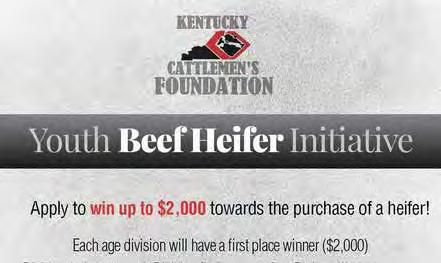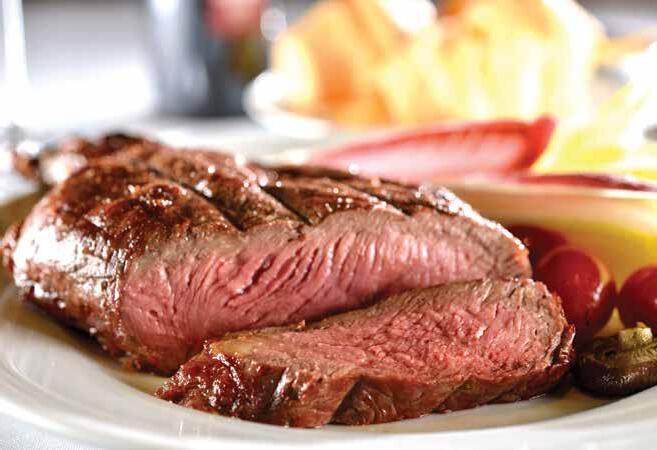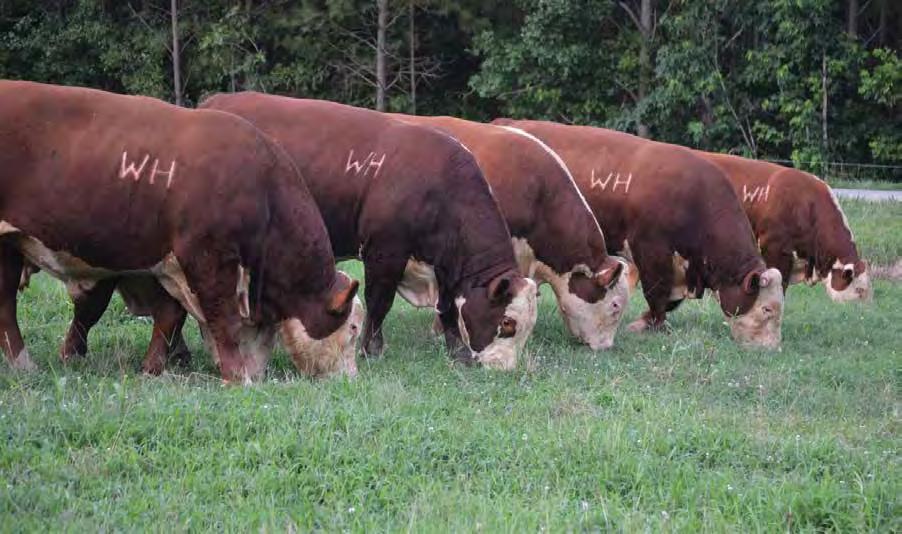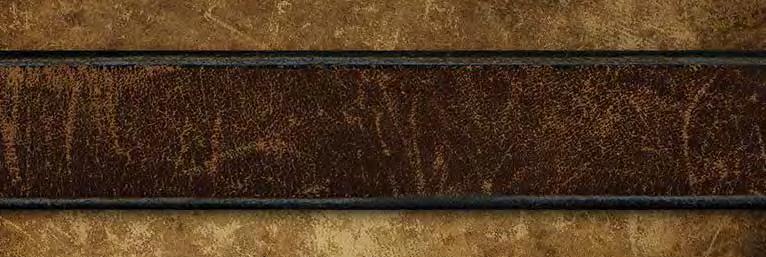
7 minute read
Value-added Feeder Calf Sales Can Increase Profits
Katie Pratt KCA Communications Manager
No matter how strong the cattle market is producers want to capture the highest profits possible from their animals. Value-added feeder calf sales are ways producers, especially those with small herds, can receive additional income. Selling in larger lots often results in a premium over prices producers would have received if they had sold their cattle in a traditional, commercial stockyards sale.
A wide range of value-added sales are offered across Kentucky throughout the year. Each sale has its own set of rules for qualifying cattle and regulations for producers to follow. Producers must to provide documentation to prove they followed the sale’s protocol. Below are descriptions of some of the valueadded feeder calf sale opportunities available to Kentucky producers, however they may not be all encompassing. Producers can find more information about a particular opportunity by contacting their local stockyards, bull breeder, breed associations, Kentucky Beef Network and UK Extension.
CPH-45 - The Kentucky Certified Preconditioned for Health program for feeder cattle was started by Roy Burris, UK emeritus professor, in the 1980s in Western Kentucky. It became a statewide program in the early 2000s through a partnership between UK and the Kentucky Beef Network. The CPH program was designed to help smaller producers combine their animals to capture price premiums that come from marketing load lots of like cattle. It has since become the standard for many value-added programs available across Kentucky. Since 2001, there have been about 400,000 head of cattle that were sold through a CPH sale in Kentucky. The state has hosted 480 CPH sales since its inception. According to the Kentucky Department of Agriculture’s Market News, cattle sold in CPH sales have averaged $5.97/cwt above the state average price. Cattle in CPH sales also tend to have more weight than typical commercial cattle. The additional pounds lead to more income.
To participate in the program, producers must be Beef Quality and Care Assurance-certified, which also occurs through the Kentucky Beef Network and UK. Producers must follow minimum weaning dates, deworming dates and vaccination schedule. Cattle must be bunk trained and dehorned. Steers must be castrated and heifers must be open. Cattle in this program are sold on special sale dates at local stockyards.
PVAP - The Post Weaning Value-Added Program (PVAP) takes CPH a step further. Producers in this KBN and UK program will keep their cattle between 45 and 120 days after weaning with the goal of preconditioning them for the feedlot. Depending on what section of the program producers enroll in, these cattle will then either be sold in Kentucky or directly to a feedlot in Iowa. Producers retain ownership through the entire process and receive carcass data from the feedlot.
From 2019 to 2022, 37 groups of calves were weaned and preconditioned through PVAP. Producers made an average of $77.60 more per head of net income by participating in this program compared to selling their calves at weaning. This net income is above the expenses producers incur raising the cattle. Only one PVAP group out of the 37 reported a loss during the three-year period.
Purebred breed association sales - Many breed associations will offer breed-specific consignment sales for registered cattle. These sales allow producers to combine their animals into larger lots that are sold to in-state and national buyers.
Many purebred sales will add another level of quality by requiring cattle to have genomic DNA tests and EPDs.
Sound recordkeeping can help producers get more for their animals because the more a buyer knows about an animal, the more they are willing to pay.
Sellers may have to pay a fee to participate in these sales along with commission. These cattle are either sold at the stockyards during a special breed-specific sale or at a farm.
Breed-influenced sales - These sales are open to producers who have cattle that are not necessarily purebred animals, but have obvious signs of a particular breed’s influence. These sales require producers to follow a similar vaccination protocol and weaning requirements as the CPH-45 program. They also require a specific tag. These sales are graded and occur at stockyards.
Shared genetics consignment sales - There are many sales across the state organized by bull breeders. The breeders will offer their customers the opportunity to market their feeder calves in a comingled sale. This type of sale ensures buyers purchase cattle with like genetics.
Some sales require producers to follow a particular health protocol while others do not. Some require the animals to have a specific tag. These sales occur at stockyards or on farms.
Some breeders will offer additional opportunities to their consignors beyond the sales. Consignors may be able to purchase feed and vaccination discounts from particular businesses. They may also have an opportunity to tour a feedlot where some of the cattle are located and receive carcass data.
Buy-back programs - Breeders will purchase their bull’s offspring from producers in some cases. Producers must follow CPH-45 protocols for this program and have calves in a specific weight range. Breeders will DNA test the animals to verify parentage and pay the state average market price plus a premium to the consignor. The breeder then backgrounds the feeder calves before selling them to a feedlot. Once the animal has been harvested, the breeder shares carcass data with producers. Producer groups - In this program, Producers from a particular area join forces to sell their cattle together.
Like in other value-added programs, participating producers want uniformity amongst the cattle. The groups regularly meet to determine time frames for weaning dates, shots and marketing their cattle. Once a decision is made, each member must follow it. Some groups will even purchase feed and vaccines for members. Buying in bulk often results in a discount for these items, which is another cost savings for producers.
Having larger numbers of like cattle creates new marketing opportunities. These groups can sell at the stockyards, but can also solicit bids or even sell online.
Stockyards value-added programs - Stockyards also have value-added program offerings for producers. These will vary by stockyard, and some will have multiple programs. Cattle must be tagged for the appropriate value-added sale. Some stockyard programs will require the producers to give the cattle certain vaccines and a specific diet. Producers may have to provide evidence of purchasing qualifying feedstuffs.
In some programs, a stockyard’s representative will visit producers’ farms to answer questions and ensure the producer is meeting program requirements.
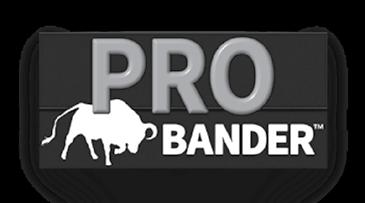
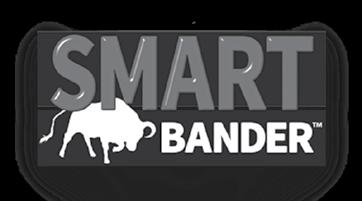

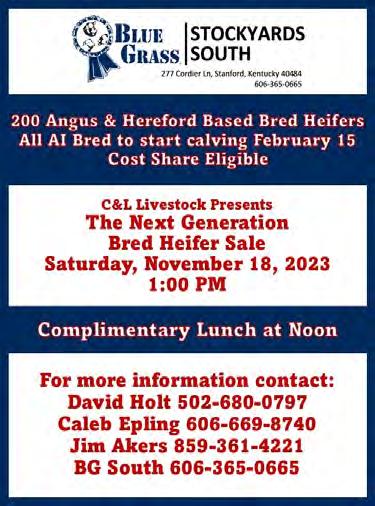
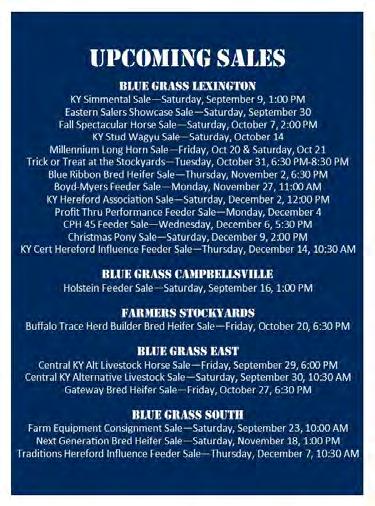

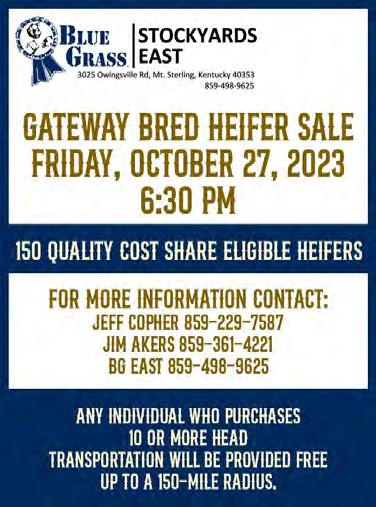
This full sister to the Genex sire, Boyd Thunderstruck 2311 sells! One of several elite females from the Abigale cow family – Bredin maternal superiority!
Big-time figures in this rare daughter of Basin Jameson 1076 –She will one of the top spring born heifers selling, plus her Sitz Stellar dam also sells safe to Boyd Bellringer 2010.
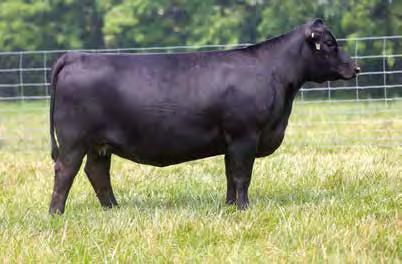
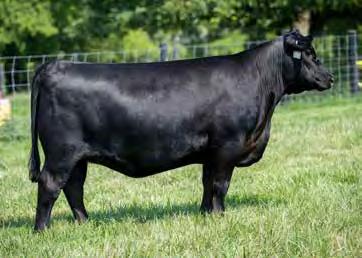


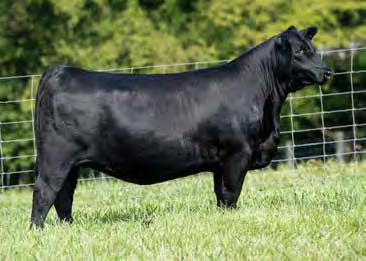
We are selling our best set of fall calving females ever – Including this outstanding Baldridge Alternative two-year old who will have
A powerful set of bred heifers will be selling, including this Poss Rawhide daughter from a dam by Musgrave 316 Stunner – Safe to GB Fireball 672.
This exceptional daughter of the popular calving ease sire, Baldridge Movin On G780 is from one of our best cow families –She sells with a calf at side by Connealy Craftsman.
Sale Managed By INC
Sale Managed By RANCE LONG 918.510.3464 RLong@RanceLong.com www.RanceLong.com
RANCE LONG, INC 918.510.3464 cell RLong@RanceLong.com www.RanceLong.com PO Box 2, Adair, OK 74330

Macey Thompson KJCA Reporter
Dear CCN Reader, The Kentucky Junior Cattlemen’s Association is gearing up for some amazing opportunities for our members! Our junior board has put a lot of dedication to the upcoming KJCA Fall Classic, the KJCA Academy and the KJCA Cattle Working Contest.
The KJCA Fall Classic will be Sept. 29-Oct. 1 in Bowling Green at the Western Kentucky University’s L.D. Brown Expo Center. We are excited to maintain our list of contests which include photography, skillathon, judging, team fitting, sales talk, showmanship and ad design. We also will be having our prospect market, cow/calf, breeding heifer, and bull shows. While this is our biggest junior event of the year, it is run completely off of sponsorships and donations, and we need your support! If you are interested in being a sponsor, please e-mail Bradon Burks at bburks@kycattle.org.
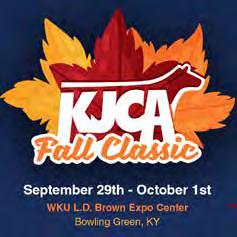
The Nebraska Youth Beef Leadership Symposium is a conference designed for high school sophomores, juniors or seniors. Students attend the leadership conference and participate in tours of feedlots, ranches and feed mills. NYBLS introduces youth to career opportunities and current issues in the beef industry, and offers education and practice in the use of leadership skills. Kentucky is able to take 10 students this year. This event is sponsored by the Kentucky Beef Council. Travel will be booked/coordinated by the KBC, but attendees may be responsible for partial cost of travel to the event. If you are interested, please fill out the application above and answer the essay question. To register, visit kycattle.org/nybls. For questions, contact Bradon Burks at bburks@kycattle.org.
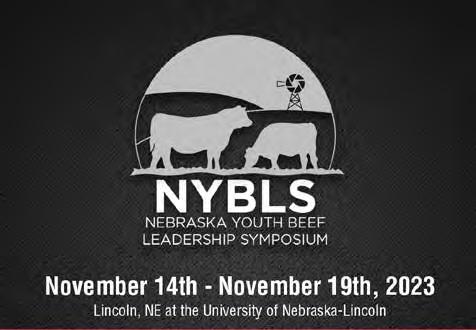
This fall, we will also be hosting our first ever KJCA Academy on Oct. 19 at the Hardin County Extension office. This event is designed to provide a yearly educational topic for our KJCA members across the state. This year the academy will go over basic cattle working/handling skills, vaccine and needle handling, as well as other BQCA principles. Registration is open now and will close Oct. 5. This event will also go over information for this spring’s KJCA Cattle Working Contest.
We are so excited to be able to offer these experiences for our members in the upcoming months. The KJCA has been an excellent tool for agriculture and youth involvement. If you have any questions about the opportunities within our association, how to register for any of our events, or how you can support the KJCA, please visit kycattle. org/kjca. We hope to see you all very soon!
Established in 2007, the Youth Beef Heifer Initiative has helped Kentucky youth purchase a heifer to begin or grow their own herd. In 2011, KCA was honored to gain Farm Credit Mid-America as a partner to ensure the continuation of this program and increase young people’s the interest in the cattle industry. One winner is selected in each age division based on their applications and responses to questions asked pertaining to the beef industry. Each of the three winners receive up to $2,000 to purchase a heifer from a Kentucky Cattlemen’s Association member. Interested youth can apply on the Kentucky Cattlemen’s Association website, https://www.kycattle.org/heifer-initiative.html.
